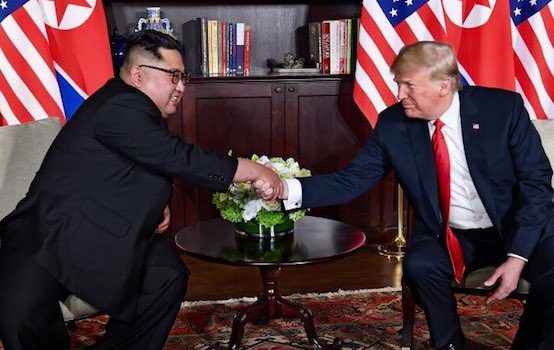Learning to Coexist Peacefully With North Korea

Over the last quarter century, U.S. policy towards North Korea has evolved into demanding Pyongyang’s complete, verifiable, and irreversible denuclearization. Under this approach, as long as the Kim regime is unwilling to part ways with its nuclear deterrent, a normal relationship between Washington and Pyongyang will have to wait.
This old denuclearization-for-peace paradigm has resulted in neither denuclearization nor peace. Three decades later, North Korea remains a vexing challenge. Yet with an American president more than happy to color outside the lines imposed by the Washington establishment, the old paradigm may finally be breaking down. Peace and reconciliation on the Korean Peninsula, including support for a more normal U.S.-North Korean bilateral relationship, has at long last become a goal pursued alongside—or even ahead of—ridding North Korea of its nuclear warheads, plutonium facilities, and missile production plants.
Steven Biegun, the Trump administration’s envoy to North Korea, expanded on this new approach in a speech last month at Stanford University. “What we’re talking about is simultaneously looking at ways to improve [U.S.-North Korean] relations [and] looking at ways to advance a more stable and peaceful and ultimately a more legal peace regime on the Korean Peninsula,” Biegun said.
This approach is totally alien to the Washington foreign policy community, which presided over a failed policy across successive administrations and that continues to take an ancillary view of the world in which the United States pressures other countries into doing what it wants without any compromise in return. These same experts interpret the promotion of peaceful relations on the Korean Peninsula not as a goal but as a concession to be bartered away in the course of negotiations for something greater.
But nothing is more beneficial to America’s national security interests and those of our allies in East Asia than a Korean Peninsula no longer at constant risk of confrontation, up to and including nuclear war.
Tranquility in the U.S.-North Korean relationship is not a point of leverage to be brandished in pursuit of Pyongyang’s denuclearization, which decades of stalemate have shown is unrealistic. On the contrary, peace on the Korean Peninsula should be the ultimate American foreign policy objective in northeast Asia.
There are some encouraging signs that the White House is coming around to this reality. Senior administration officials, from Secretary of State Mike Pompeo to President Trump himself, are talking more frequently about the importance of transforming the Korean Peninsula into a zone of opportunity. U.S. and North Korean officials are in preliminary discussions about opening up liaison offices in one another’s capitals, as CNN reported this week. If that happens, it will be a significant step towards a more congenial bilateral relationship, one that would have been unthinkable even a year ago.
Active work to put diplomacy on a more solid foundation is the brightest signal to date that the Trump administration has recognized a more normal discourse with a long-time adversary. This is an historic accomplishment in its own right and may increase the chances of North Korea’s denuclearization in the future.
With President Trump and North Korean leader Kim Jong-un two weeks away from their second summit in eight months, many journalists and experts have focused on the question of what nuclear concessions the U.S. will secure. But there is a bigger story for those willing to see it: after nearly seven decades of mutual distrust, the U.S. and North Korea may find a way to coexist peacefully. This is the standard that will determine whether the current diplomacy can be labeled a success.
Daniel DePetris is a fellow at Defense Priorities.
Comments